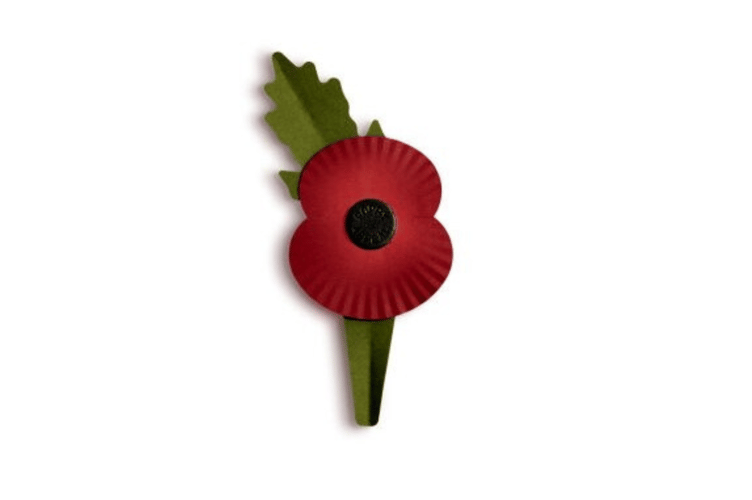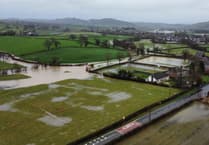The Royal British Legion launches its 2023 Poppy Appeal today (Thursday 26 October), with the public able to get hold of its newly designed plastic-free poppy for the first time.
72-year-old veteran and Poppy Appeal Organiser Manny Manfred from Newcastle Emlyn is thrilled with the new poppy, which is completely recyclable.
This year’s plastic-free poppy is the first redesign of the iconic symbol of Remembrance in a generation and is the latest in a series of designs since the poppy was first used to raise funds in 1921.
The plastic-free poppy is made from 100 per cent paper and easily recycled in household collections. The innovative new poppy design features iconic poppy shape, with a black centre embossed with ‘Poppy Appeal’, and a leaf with a crease. It no longer has a plastic stem or centre, and it can be fastened with a pin in the stem, worn in a buttonhole, or a stick-on version is available.
The Royal British Legion has been developing the plastic-free poppy for the past three years, in collaboration with expert partners, as it works to reduce its use of single-use plastic and be economical, sustainable, and less impactful to the environment.

It has been created from bespoke red and green paper produced from a blend of renewable fibres from responsible sources, 50 per cent of which come from the offcuts created during the production of paper coffee cups.
The launch of the Royal British Legion Poppy Appeal marks the start of the national period of Remembrance, when the nation wears the poppy and reflects on the service and sacrifice of the Armed Forces.
Members of the public will be able to get their poppy – the original version or the new plastic-free version - from thousands of volunteers across the UK, or from major supermarkets.
All funds raised from the Poppy Appeal will be used by Royal British Legion to support serving personnel, veterans, and their families in a range of ways, from help with the cost of living, mental wellbeing and housing, to support with recovery after trauma or illness.
During the Falklands War, Manny Manfred was a Platoon Sergeant in A Company, 3rd Battalion of the Parachute Regiment (3 PARA) where he led his Platoon during the Battle of Mount Longdon. The Battle of Mount Longdon lasted 9 hours, with 23 men killed and Manny knew many of them, some very well.
Now as the newly appointed Poppy Appeal Organiser for Newcastle Emlyn, Manny is thrilled to welcome the new plastic free poppy.
Manny said: “Out with the old and in with the new! We don’t need to wait for the New Year.”
“I’m impressed with the new style fully recyclable poppies. They are easier to handle and, because they lay flat, packaging is greatly reduced…there are still a considerable number of the old style available and here in Newcastle Emlyn we are issuing a mix.”Director of the Royal British Legion Poppy Appeal, Andy Taylor-Whyte said: “We want to encourage as many people as possible to get a poppy this year and show their gratitude and support to those in the Armed Forces whose service and sacrifice should never be forgotten. We’re so proud that this year, we have our new plastic-free poppy too, so that the public can wear this poignant symbol of Remembrance, with less impact on the environment.
“Since the first Poppy Appeal in 1921 to today, public donations have provided a lifeline for service people and their families, and last year, we helped more than 27,000 people in the Armed Forces community.
“As a veteran myself, I am grateful to the public for digging deep to get a poppy. Donations enable us to support veterans, and servicemen and women all year round while wearing a poppy shows them you care.”
To find out more or to donate to the Poppy Appeal please visit rbl.org.uk
The evolution of the poppy
- The Royal British Legion’s poppy manufacturing HQ in Kent will be operating at full capacity to produce 170,000 poppies every day - to satisfy the public’s desire to wear a poppy to show the Armed Forces community they care.
- The Royal British Legion worked with scientists at University College London to assess the environmental impact of the new poppy and ensure its sustainability. Their analysis revealed that the new poppy will reduce carbon emissions by 40 per cent compared with the traditional poppy.
- The plastic-free poppy, which was created in collaboration with designers Matter and with bespoke paper supplier James Cropper, will be available alongside remaining stocks of the current poppy to reduce any waste of poppies already produced.
- There have been more than ten versions of the poppy through the years, from hand-crafted red silk versions with wire stems in the 20s, through to a cardboard ‘austerity poppy’ in wartime in the 40s and onwards to cotton, paper and plastic examples.





Comments
This article has no comments yet. Be the first to leave a comment.